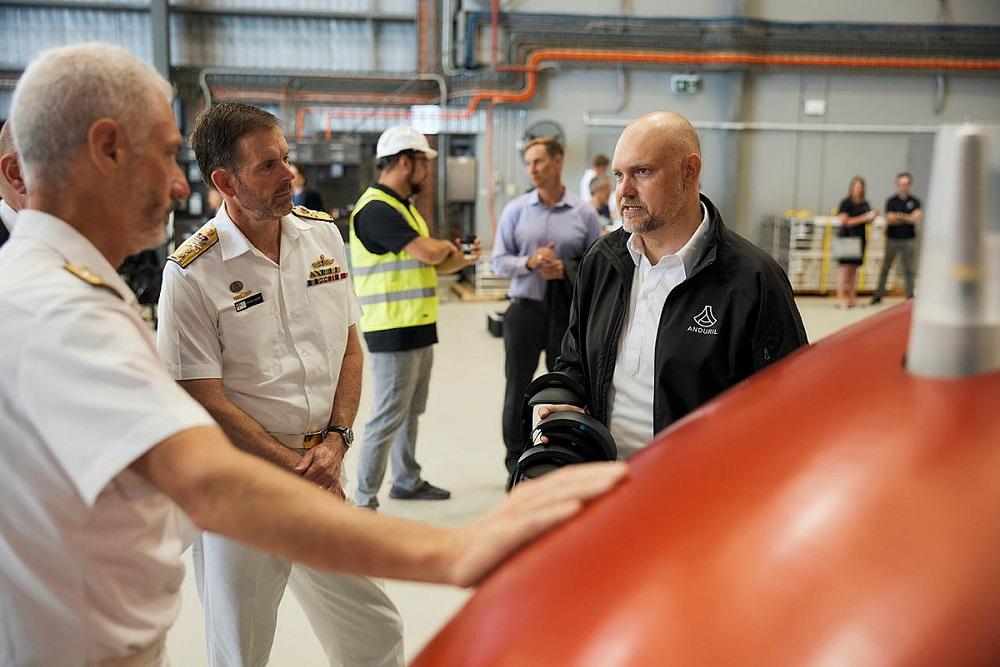Can Defence replicate its Ghost Shark success?
Posted By Hayley Channer on October 17, 2023 @ 15:00

With a focus on the defence strategic review and AUKUS, the Australian government is increasingly concerned about how it can mobilise private capital [1] to acquire the capabilities and technologies necessary to respond to shifting security dynamics—and fast. While the Defence Department has launched new defence capability transition initiatives like the Advanced Strategic Capabilities Accelerator (ASCA), much of today’s technology innovation occurs in the private sector. Some have pointed to Defence’s partnership with Anduril Australia on undersea capabilities as a shining example of how public–private partnerships in defence can work. But can it be replicated?
In May 2022, Defence and Anduril Australia announced the co-development of an extra-large, autonomous robotic undersea vehicle, later named ‘Ghost Shark [2]’. If successful, the Ghost Shark would represent a brand-new capability for the Australian Navy. The vehicle would be able to remain at sea for long periods, cover long distances and carry military payloads. Defence and Anduril Australia are contributing equally to the $140 million co-development agreement. The intention is for three [3] different Ghost Shark prototypes to be operational by mid-2025.
Compared with Defence’s usual contracting and development timeline, the Ghost Shark program has progressed at breakneck speed. As an example, Defence and Anduril Australia were under contract within 152 days [2] when the typical contract process can take anywhere from 12 to 36 months. Rapid progress has been further supported by scientists and engineers from the Defence Science and Technology Group (DTSG) working alongside Anduril Australia technicians, allowing for faster design, modelling and testing.
In explaining the Ghost Shark’s faster development, government and industry emphasise different factors and hold differing views on how likely it will be to replicate this speed with other capabilities.
The primary reason the Ghost Shark project could move quickly was that Defence and Anduril Australia were willing to accept higher levels of risk to ensure a flexible contract. Defence gave the project senior-level support, used flexible contract mechanisms and agreed to co-development. The project’s ongoing governance includes Defence and Anduril Australia staff supporting an executive steering group, a project management committee and several working groups. These groups meet regularly, agree and modify ongoing work plans, and allow the program to evolve as required to meet the agreed outcomes. This approach provides flexibility to allow core decisions to be made throughout the project, rather than having everything defined in the contract.
Other factors, both at a global security level and at the interpersonal level, may have also played a role in motivating senior-level stakeholders. These include Russia’s invasion of Ukraine underscoring the importance of autonomy in warfighting (the Ghost Shark is seeking to be an autonomous vessel) and pre-existing relationships of trust and shared vision between Defence and Anduril Australia senior executives. From industry’s perspective, these factors—which were unique to the circumstances at the time and the people involved—make it less likely that capabilities beyond Ghost Shark could be fast-tracked as successfully.
While some in industry hold doubts, Defence has confidence that the Ghost Shark’s development model can be replicated. In part, this is because it has already adopted aspects of this model for other projects.
Defence’s intention is to employ the same flexible contracting arrangements that underpin the Ghost Shark for future ASCA projects. Down the track, Defence is seeking to build consortium to allow start-ups and small and medium-sized enterprises to work on ASCA’s missions independently of being contracted to a defence prime. If this goal is realised, there could be real benefits to Australian SMEs. In the meantime, the Ghost Shark project is supporting Australian SME growth. Anduril Australia has down-selected around 15 Australian companies [4] to fill parts of the Ghost Shark supply chain and is providing mentorship and connecting them with its venture-capital network.
However, simply replicating the Ghost Shark approach for every Defence–industry partnership is unfortunately not possible.
Defence’s partnership with Anduril Australia is unique in some ways because they already had a trusted relationship and shared vision. Unlike small, stand-alone Australian companies, Anduril Australia is the subsidiary of major US company, Anduril Industries, which is valued at more than US$8 billion [5]. Anduril Australia has access to networks, capital and commercial intelligence that many Australian SMEs lack. It can also afford to further develop its initial offerings to potential customers.
Highlighting this approach, Anduril Australia CEO David Goodrich recently said [3]: ‘Anduril doesn’t wait for government to fund its ideas and its programs; Anduril uses its own internal sources of capital to develop products ahead of a capability requirement.’ But he has also noted that ‘partnering with DSTG and navy has enabled the program to achieve outcomes we would not have been able to do on our own’.
For Australian SMEs that don’t have access to financial reserves and networks or an established track-record with Defence, mirroring the Ghost Shark model will be challenging. Still, there are useful lessons to observe. The most pertinent for Australian SMEs is that Defence—and DSTG specifically—is embracing the practical need for innovation and partnering with industry more broadly. Other lessons are that Defence can employ flexible contracting, senior-level support from Defence is critical, and faster outcomes can be achieved by having DSTG scientists working alongside private industry.
While the Ghost Shark program’s specific circumstances may be difficult to replicate, Defence can learn from its success. One way to improve the speed to capability is to identify a shortlist of small Australian defence companies with promising products where flexible procurement contracts and co-development can be used to develop new capabilities as quickly as possible.
Article printed from The Strategist: https://aspistrategist.ru
URL to article: /can-defence-replicate-its-ghost-shark-success/
URLs in this post:
[1] how it can mobilise private capital: https://www.ussc.edu.au/upscale
[2] Ghost Shark: https://www.defence.gov.au/news-events/news/2022-12-14/ghost-shark-stealthy-game-changer
[3] three: https://www.theaustralian.com.au/special-reports/ghost-shark-to-challenge-traditional-sea-power/news
[4] 15 Australian companies: https://www.innovationaus.com/defence-co-funds-undersea-drones-with-american-tech-firm/
[5] US$8 billion: https://blog.anduril.com/anduril-raises-1-48-billion-in-series-e-funding-ac8c7299d182?gi=48c464a44e3d
Click here to print.